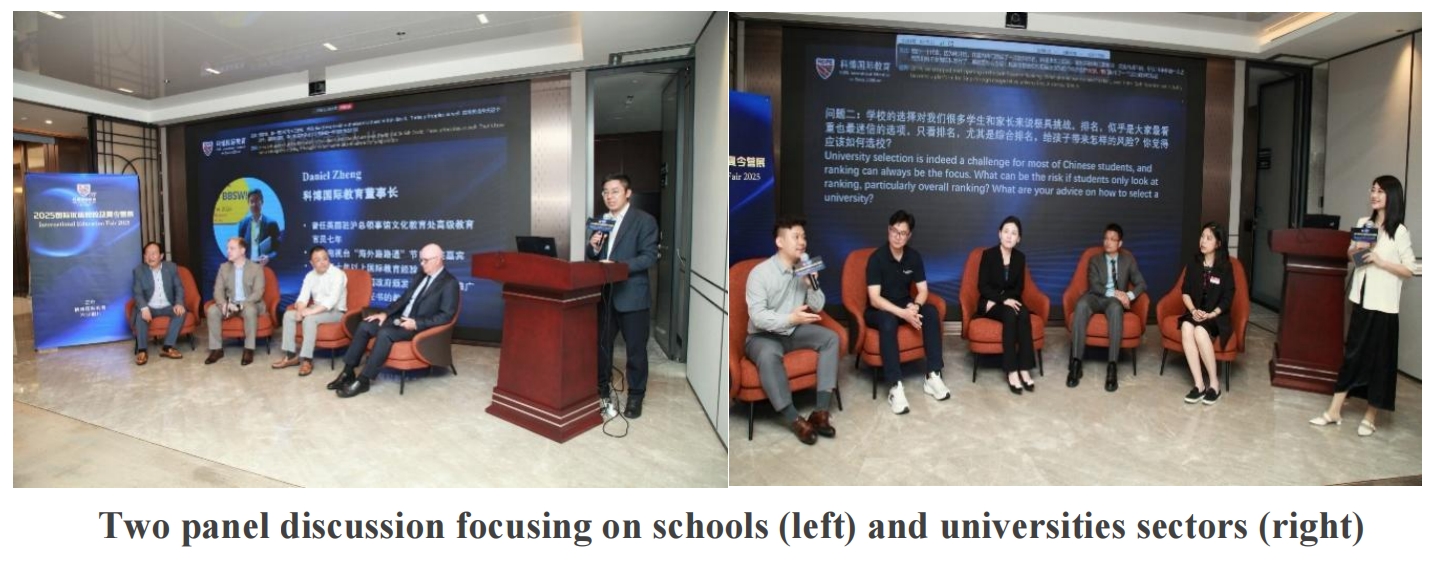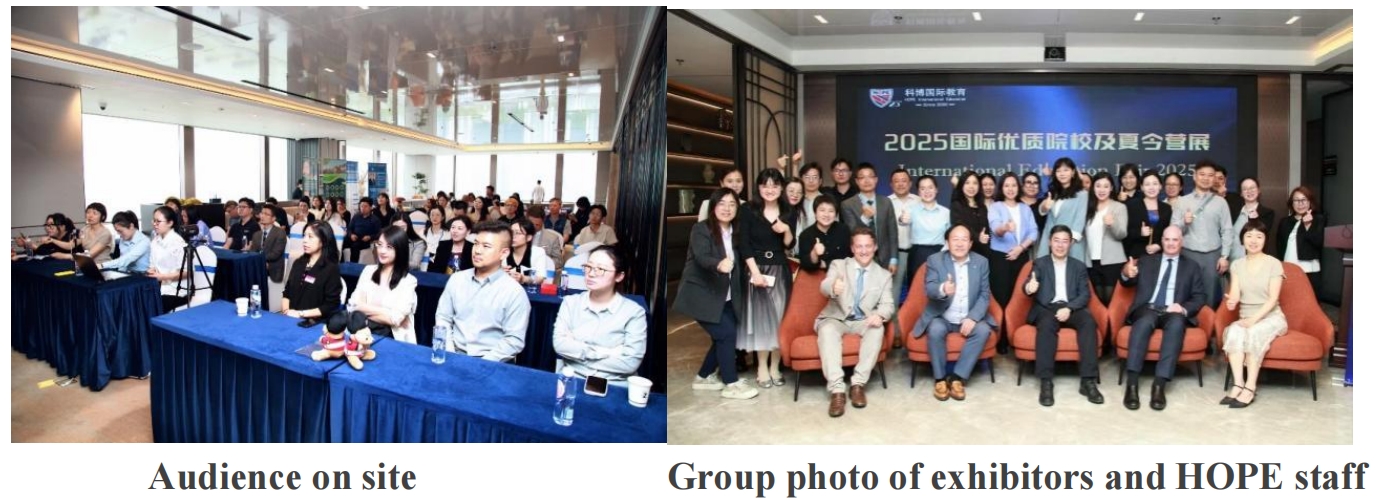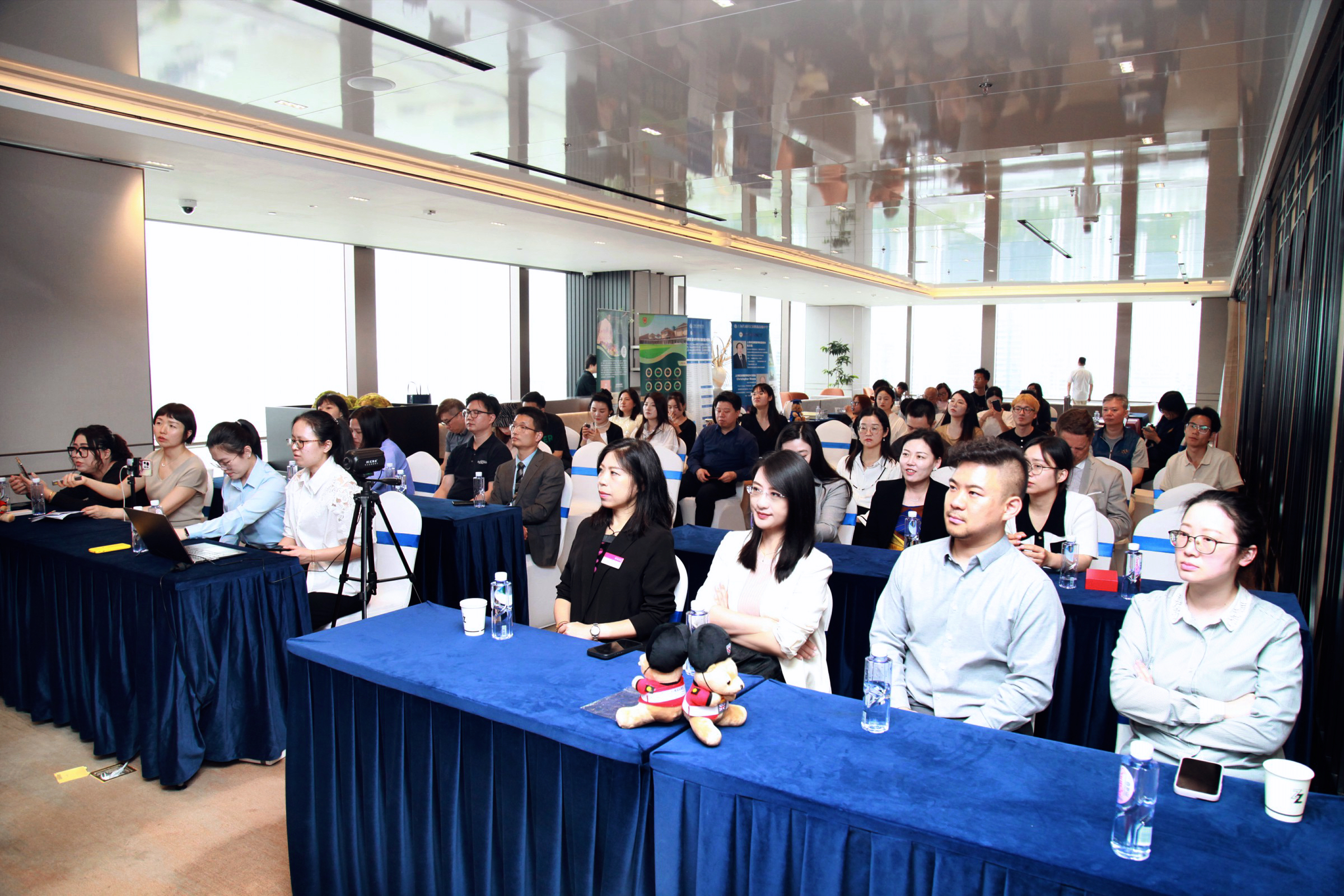Under the impact of economic downturn and changing international situation, the number of students going abroad has been decreasing, and the destination countries are more diversified. HOPE’s International Education and Summer Camp Fair on 19th April further suggested this trend.
15 universities and schools from China, UK, Australia, Malaysia, and Switzerland, as well as the British Council were invited to this half-day event in Shanghai. About 30 families joined the fair. The number of participating families was lower than our expectation (We expect 50), however, the presented visitors showed different interest in different international education pathways and destination countries. The enquiries on UK, Australia were not as dominant as before, while institutions in Malaysia (University of Southampton Malaysia), international schools in Shanghai and joint venture institutions (University of Nottingham Ningbo) also gained popularity.

The fair included two parts: two panel discussion (one focus on school sector and the other university sector) and individual counselling and interviews. The panel discussion also inspired both participating institutions on market trend and parents/students for various choices they have respectively. The following were the selected topics questions and answers from the panelists.
Questions for the panel discussion (school sector) moderated by Daniel Zheng, MD HOPE:
1. Under changeable international affairs and economic downwardness, are international education pathway and study abroad still cost-effective choice for Chinese families?
Mr. Chen Wenguo, Principal, Hongrun Boyuan School in Shanghai:
Yes, it’s still a cost-effective choice. For international education, it was first considered by wealthy families. With the increasing wealth in China in recent years, the number of very wealthy families has also grown, and more families are considering sending their children to study abroad. For most families facing the global changes, it is increasingly important to consider from a strategic perspective what kind of person their children should become. It is not just about reading and mastering knowledge. In the era of AI, the goal of cultivating children has changed a lot. It is necessary to cultivate their ability to communicate across cultures, have critical thinking, and independently judge, think, and solve problems in complex environments. In the international education environment, such talents can be cultivated to become lifelong learners who will not feel difficult in any environment. The more challenges they encounter, the more excited they will feel. It is very important to help children find the meaning of life.
Daniel Zheng:
I quite agree with you. International education should consider not only the job opportunities, career pathways, but also the true meaning of cultivating children to take an international vision. At least, from an economic perspective, families now have more choices to select.
Mr. David Ranson, Foreign Principal, Zeolym High School Shanghai:
Well, I guess we do. That’s why we are here. The world is so small. If British kids only know Britain, they’re going to suffer. The same as Chinese students. They need experience both. They need to be exposed to the world and to the global market and not just be fluent in English or French or whatever other languages, but they need to be able to culturally adapt as well. Because Language itself is not enough. We need begin this learning journey with the goal in mind, what do we need to do and what do we want for our children? And I think we want them to have a really great learning experience. They can go to a good university and contribute the economy and to the family life. It’s about the future and future generation.
2. After pandemic, Chinese families are more rational to studying abroad; safety, education quality, pastoral care, university destination, tuition fee are all elements that families are considering; from which area, does your school give more confidence to choose your school?
Mr. Chong Meng, International Admission and Marketing Director, Charterhouse International Secondary School, Malaysia:
Safety, employment, adaptability, enrollment rate, and ranking are common concerns for parents. Choosing an overseas school with a lower teacher-student ratio will also help students to better integrate into local education. The international situation is changing, parents will prefer to choose a closer place with high security, such as Singapore, Malaysia, Hong Kong region and mainland China.
Mr. David Mustafa, Principal, Holmes Grammar School, Australia:
Parents are concerned about the progression rate, quality of education, safety, and costs. The school is also concerned about the services and welfare of international students, and pays special attention to the academics of students, like if you study in Australia, it is relatively easier to enter the University of Melbourne than applying from China.
3. What type of students are suitable to study abroad? What are the main challenges for students to study abroad at a young age?
Mr. Chen Wenguo, Principal, Hongrun Boyuan School in Shanghai:
The best fit depends on the child's own wishes and if the child is self-controlled, independent and the adaptability to the environment. The student must have a sense of purpose. Such well-prepared student is suitable to study abroad. The biggest challenge for students is the loneliness of the mind.
Daniel Zheng:
To some extent, self-adaptability and independence can be more important than academic ability.
Mr. David Ranson, Foreign Principal, Zeolym High School:
Students need comprehensive quality and have confidence and caring, not just focused on academic ability.
Mr. Chong Meng, International Admission and Marketing Director, Charterhouse International Secondary School, Malaysia:
Chinese students don't know what they want to do in the future, and the challenge for schools is guiding children and let them know how to make decisions.
4. To choose an international education pathway or study abroad, how does a family make plans, and what preparation does a family need to make?
Mr. David Ranson, Foreign Principal, Zeolym High School:
Researching study abroad destinations, schools, or making the transition to an international school at home is also an option.
Mr. Chen Wenguo, Principal, Hongrun Boyuan School in Shanghai:
It is recommended that children go out to study after high school when they are maturer, the child will be more competitive outside in the future.

Panel discussion questions (University sector) moderated by Chanel Zhang, HOPE
1. Study abroad destination countries are more diversified for Chinese students after Pandemic, what do you think the main reasons?
Mr. Gavin Ge, Country Manager, University of Sussex, UK:
Unlike the closed information in the past, nowadays the channels of obtaining information are exceptionally large, and people find that not only those traditional choices, stemming from China's cultural self-confidence, there are different needs, and there are different places to meet the needs. Each school has its own strength, and the most important thing is to choose their own fit.
Ms. Emma Liu, China Project Manager, University of Reading, UK:
As a traditional country for studying abroad, UK has academic advantages and professional choices. We have exchanges with various study abroad destinations, and while studying in the UK, we also have the opportunity to exchange to other places to experience the culture of other countries.
2. University selection is indeed a challenge for most of Chinese students, and ranking can always be the focus. What can be the risk if students only look at ranking, particularly overall ranking? What is your advice on how to select a university?
Ms. Emma Liu, China Project Manager, University of Reading, UK:
In addition to the overall rankings, more consideration should be given to subject rankings, employment experience, learning experience, location, etc.
Mr. Darren Chen, Senior Manager, University of Nottingham Ningbo:
Choosing a major and school needs to be combined with a life plan and using a degree as a way to plan your life. Rankings have to change based on time and experience.
3. Many students and parents think that in China, the employers are more caring about the students’ graduating university, rather than the subjects they study. How important do you think the subject is? From data of your university, students graduating from which subject areas in fact have higher employment rate? What career services does your university provide to students?
Ms. Daisy Chen, Country Manager, Coventry University, UK:
When looking for a job, the prestigious school label is only a gateway, not a deciding factor. When a student is interviewed, what is more important is the student's professional background. Each university offers students a wide range of services and resources, depending on whether the professors at the school have resources on the corporate sector.
4. Recently, there is quite a lot of press coverage about fake application documents, cheating for English language and entry tests. What does your university respond to this and what measures are you taking? What is your advice to students who are applying?
Ms. Daisy Chen, Country Manager, Coventry University, UK:
Once a student is found to have falsified his/her documents, even if he/she has already arrived in the UK, we will still dissuade him/her from the program and will not refund the deposit. Honesty is very important.
Mr. Allan Gan, Student Recruitment Manager, University of Southampton Malaysia:
Don’t take risk and advantage of rule. If the grades are not up to standard, please work hard. Be true, be honesty.

Here the suggestion from HOPE: In the face of the complex and ever-changing international environment, on one hand, it is recommended that overseas universities attach importance to services, especially in career development and employment internships, which are currently of concern to parents and students. Meanwhile, we suggest that parents and students should consider major selection and career development in addition to overall ranking.




